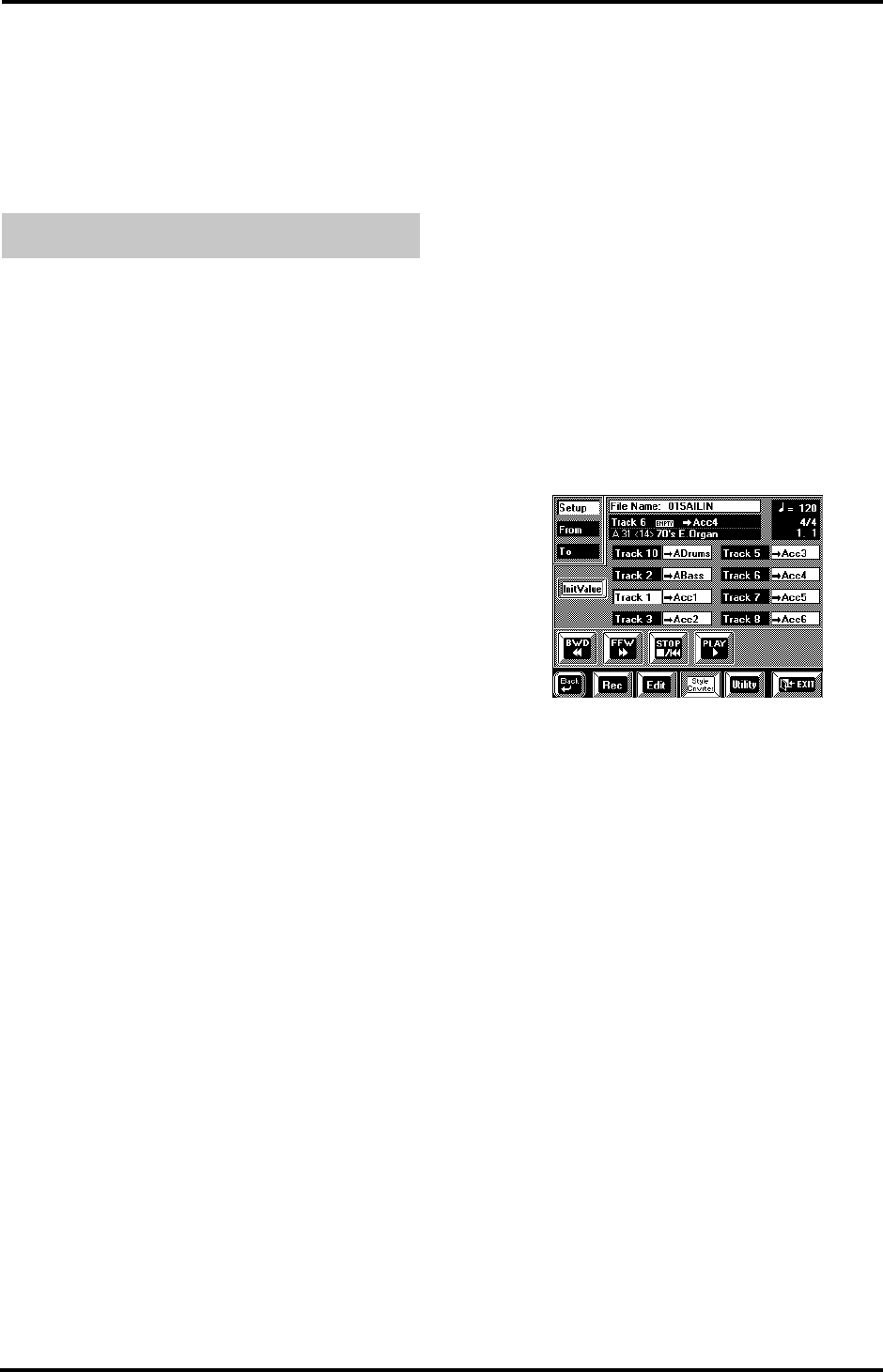
155
VA-76 – Style Converter
Note: If the original was referenced by a User Program and
if you now wish to use the new version (saved under a dif-
ferent File Name), do not forget to change the Song Link
setting (see page 130).
Initialize
See page 145.
The VA-76’s Style Converter is an easy and intuitive
tool for creating your own Music Styles based on one
of your own songs or a Standard MIDI File. In either
case, it is enough to play back the song or Standard
MIDI File once to transfer its data into the VA-76’s
Song RAM memory where you can use the Style Con-
verter. You may want to edit the song before convert-
ing parts of it into a Music Style. See “In-depth editing
of a 16-track song” on page 148 and “Change” on
page 152 for details.
General considerations
Here are a few guidelines for converting song parts to
a User Style:
• See “Concept” on page 163 and “Looped vs one-shot”
on page 164 for details about User Styles.
• The resulting Music Style can be used in Arranger
mode (not in Song Composer/16-track Sequencer
mode).
• Music Styles are accompaniment patterns. If the new
Style should be generally usable (i.e., also for other
songs), try to avoid chord changes in the “basic” pat-
terns (Original, Variation, etc.). You can transpose
your Styles in realtime by playing different chords in
the chord recognition area. Also, avoid to include the
melody in your conversion.
• Try to isolate the parts that are really typical of the
song.
• Transitions, rolls, etc., should be converted to Fill-Ins.
The intro should be converted to an Intro pattern.
• For a really professional result, you will also have to
take advantage of the VA-76’s User Style mode to
ensure that your new Style also “works” for minor and
seventh chords. See “Programming User Styles” on
page 163.
• Though pattern length (and memory capacity) is no
issue, try to work in small but meaningful units.
Here’s an example: most songs rely on a structure
based on 4-measure blocks. Converting 6 measures is
thus a bit odd (though perfectly possible).
• Be sure to prepare a simple pattern for Original/Basic
(Orchestrator B) and more complex accompani-
ments for the remaining patterns.
• Be sure to set the right Key (see page 156). Only then
will the Style really work as expected when used in the
VA-76’s Arranger mode.
• Your new Style resides in the VA-76 Style RAM mem-
ory (Disk User). Do not forget to save it to disk before
selecting another Style (in Arranger mode) or switch-
ing off the VA-76.
• Commercially available Standard MIDI Files are pro-
tected by a copyright. Please note that the Style Con-
verter should only be used for creating Music Styles for
private use. Roland assumes no responsibility for copy-
right infringements that may result from the use of the
Style Converter.
Using the Style Converter
1.
If necessary, start playback of a Standard MIDI File
to load the data into the VA-76’s Song RAM. See “Lis-
tening to Standard MIDI Files” on page 31 for details.
2.
Press the [SONG COMPOSER] button.
3.
Press the [16 Tracks Sequencer] field.
4.
Press the [Style Cnvrter] field in the bottom row. If
[Setup] is not displayed in white, press this field.
This page allows you to assign the desired song tracks
to User Style tracks. Remember that a song can con-
tain up to 16 tracks, while a User Style “only” provides
eight. Be sure to select the tracks you want to include
in the resulting accompaniment.
Use the numbered Track fields (1~8) to assign a song
track to User Style tracks (ADrums, ABass, Acc1~
Acc6). You can press [Init Value] to load the default
assignments (see the above illustration).
Please note that these defaults are only based on com-
mon sense and may not yield the desired accompani-
ment pattern. As a rule, you should always listen
carefully. But you may have noticed that track 4 (the
melody) is automatically omitted. You should keep it
that way.
Note: Be sure to make all desired assignments before press-
ing the [From] or [To] field. There, you can indeed only
work with the assigned tracks.
11.3 Style Converter
VA-76.book Page 155 Friday, January 12, 2001 12:35 PM


















